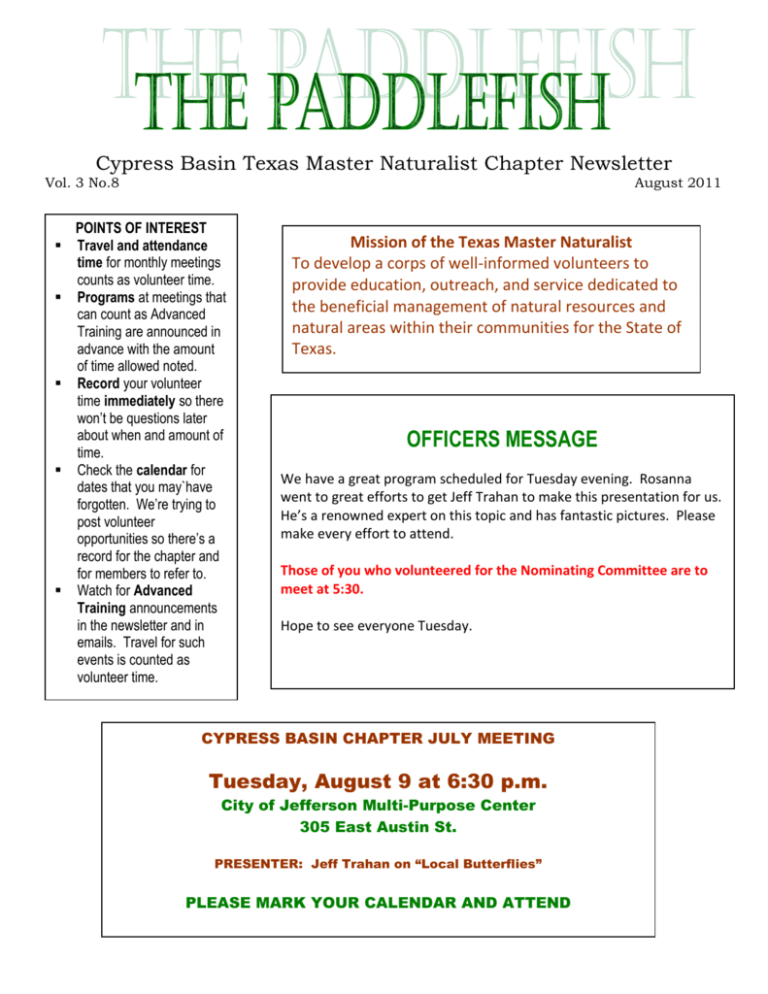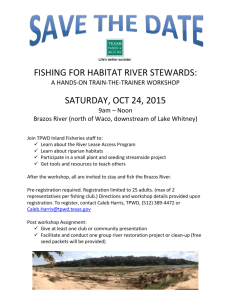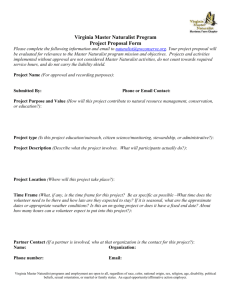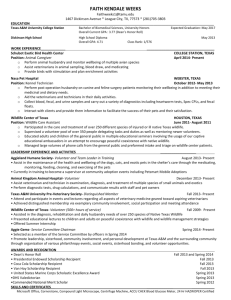CBTMN Paddlefish_August 2011
advertisement

Cypress Basin Texas Master Naturalist Chapter Newsletter Vol. 3 No.8 August 2011 POINTS OF INTEREST Travel and attendance time for monthly meetings counts as volunteer time. Programs at meetings that can count as Advanced Training are announced in advance with the amount of time allowed noted. Record your volunteer time immediately so there won’t be questions later about when and amount of time. Check the calendar for dates that you may`have forgotten. We’re trying to post volunteer opportunities so there’s a record for the chapter and for members to refer to. Watch for Advanced Training announcements in the newsletter and in emails. Travel for such events is counted as volunteer time. Mission of the Texas Master Naturalist To develop a corps of well-informed volunteers to provide education, outreach, and service dedicated to the beneficial management of natural resources and natural areas within their communities for the State of Texas. OFFICERS MESSAGE We have a great program scheduled for Tuesday evening. Rosanna went to great efforts to get Jeff Trahan to make this presentation for us. He’s a renowned expert on this topic and has fantastic pictures. Please make every effort to attend. Those of you who volunteered for the Nominating Committee are to meet at 5:30. Hope to see everyone Tuesday. CYPRESS BASIN CHAPTER JULY MEETING Tuesday, August 9 at 6:30 p.m. City of Jefferson Multi-Purpose Center 305 East Austin St. PRESENTER: Jeff Trahan on “Local Butterflies” PLEASE MARK YOUR CALENDAR AND ATTEND TEXAS BUDGET CUTS HURT TPWD The Texas fiscal year 2012 budget will have a major impact on Texas Parks and Wildlife’s activities across the state. The immediate impact upon us here in the Cypress Basin is the loss of the positions held by Ricky Maxey and that of Irene Hamel in Tyler. Both of these professional people have served the Master Naturalist Program with their expertise, time, and dedication. They will be sorely missed. As of yet there has been no news from the state about any changes that may come about in the Master Naturalist program due to the budget cuts. We received word that Sonny Arnold is retiring. There has not been an announcement as to a replacement for that position. Printed below is a summary from Steve Lange, Regional GIS Specialist (TWIMS) Wildlife Regions III & IV, concerning the impact of the budget cuts. It’s worthy of printing in its entirety. FTE is full time employee. Impact of Budget Cuts to TPWD As of late last week, all TPWD employees who were affected by the reduction in force necessitated by cuts to the FY 12 state budget have been informed. TPWD funding was cut by $150.61 million (21.5%). Since mid-May, TPWD has eliminated 169 positions, 111 of which were occupied. All affected employees received 45 days severance pay and TPWD’s Human Resource Division is coordinating with the Workforce Commission to provide job placement resources. The TPW Commission reviewed staff recommendations for the upcoming fiscal year budget in a budget workshop on June 30 and will take formal action to adopt the budget at its August 25 meeting. Here’s a brief summary of budget cuts that will affect key TPWD programs and services: State Parks: Cut more than 60 FTEs. 2 SP Regional offices closed. 23 of 94 State Parks received some type of reduction in staff, operations or both. One state park (Sebastopol) to be transferred to local community for ownership and management. One SP Complex office (El Paso) closed. No state funding for local park grants for upcoming biennium. Wildlife: Cut 30 FTEs. The Wildlife Interpretive Program has been eliminated. Eleven positions were cut from Wildlife Diversity. $100,000 was cut from the Public Hunting operating budget. Inland Fisheries: Cut 18.75 FTEs. Funding for golden algae research and treatment has been eliminated. Habitat Conservation cuts will require closer statewide coordination with other divisions on kills and spills plus additional training and increased responsibility for existing staff. Capability to treat noxious aquatic vegetation statewide is reduced significantly. Analytical Lab cuts will result in reduction in sample processing capability and slower processing of samples. Fewer scientific studies will be completed and fewer fisheries management surveys will be conducted. Education programming will be reduced and marketing will be eliminated at the Texas Freshwater Fisheries Center. Visitor programs will be reduced. Fewer hatchery ponds will be stocked (resulting in fewer fish stocked in public waters) and facility maintenance will be selectively deferred. Outreach events involving TPWD supplied fish and fish tank will be significantly reduced. Angler Recognition program will be scaled back, and obtaining exotic species permits will take longer. Coastal Fisheries The commercial license buy-back program will be reduced by $1 million in both FY12 and FY13. This means an estimated 244 licenses (122 per year) will not be purchased and retired in the shrimp, finfish and crab fisheries. The impact will be no reduction in fishing effort, no reduction in inshore shrimp bycatch and no reduction in fishing mortality in each of these fisheries. Communications: Cut 14.5 FTEs. TPW Magazine will be cut from 12 to 10 issues annually with more staff-produced articles and photographs. Also, it will no longer be provided free to retirees or individual employees. HQ copy service support will be eliminated, though the HQ convenience copiers managed by Creative Services and the EO copiers still will be supplied with paper and toner on a regular schedule. Gary Job Corps services are no longer available. TPWD’s event calendar will be automated once a new content management system (Plone) is implemented and divisions will then be responsible for posting their own events. Boater Education field staff positions have been cut. The majority of demand is expected to be handled through internet certifications with Texas Game Wardens being called on to assist in providing in-person classes if requested. Administrative Resources: Cut 17 FTEs in accounts payable, property accounting, purchasing, boat titling and registration, revenue control and distribution services, and park revenue accounting. Information Technology: 6 FTEs cut The Communications Coordinator position was cut. IT also cut its programmer and quality assurance positions, which will impact the development and delivery timelines of agency custom applications. Reductions in Administrative Services will impact procurement of technology services. Cutting a GIS Analyst position will result in increased time in providing GIS services. Loss of a Help Desk position will result in increased time in providing Help Desk services. Human Resources: Cut 3 FTEs, a receptionist, a training specialist and an administrative assistant. Infrastructure: Cut 23 positions. The impact of these cuts will be a slower response time and a lengthening of project schedules. One position that assists sites with TCEQ and ADA violations was transferred to state parks. FALL RETREAT UPDATE With 11 votes for first choice the Fresh Water Fisheries Bird Walk/Dive Show/Tram Tour was the choice of most for the Fall Retreat. The date for that event is October 8. The long range forecast predicts that we’ll still be under extreme heat conditions until the end of October. That same event is also scheduled for November 12. Tuesday night we’ll discuss the possibility of attending the later one. Bring your calendar so we can look at options. IMPORTANT INFORMATION ABOUT THE TEXAS MASTER NATURALIST PROGRAM Sponsorship: At the state level, the Texas Master Naturalist program is sponsored jointly by Texas Cooperative Extension (TCE) and the Texas Parks & Wildlife Department (TPWD). Partnerships at the local level are encouraged and might include other public agencies, as well as private organizations whose interests are within the boundaries of the program. At the state level, the Texas Master Naturalist program is supported financially by TPWD and TCE along with occasional grants from other outside sources when available. Objectives: 1. Improve public understanding of natural resource ecology and management by developing a pool of local knowledge about natural resource ecology that can be used to enhance education efforts within local communities. 2. Enhance existing natural resources education and outreach activities by providing natural resources training at the local level, thereby developing a supply of dedicated and informed volunteers. 3. Develop a Texas Master Naturalist volunteer network that can be self-sufficient. Volunteer Service Criteria: The following points are considered in approving volunteer service projects: 1. Is the proposed service project representative of the goals, practices and teachings of the Texas Master Naturalist Program? 2. How does the project address a pressing naturalist, natural resource management, chapter and/or partner need for meaningful service or resources? 3. What is the scope of the project in terms of when it would need to be conducted, where, estimated time needed to complete or maintain per month, how many volunteers would be needed, etc.? 4. Is the project within the Chapter’s service area and ecological training? 5. How does the project allow the chapter to focus and/or create visibility, identity and/or recruitment for the chapter? 6. How can the project’s impact on the community and our natural resources be measured? Advanced Training Criteria: Does the Advanced Training opportunity: 1. Promote continued learning and development of naturalist skills? 2. Provide Master Naturalists with knowledge and skills to work in volunteer efforts? 3. Direct trained volunteers toward specific programs in need of their services? 4. Provide practical information and training for application in volunteer efforts? 5. Take advantage of local partnerships? 6. Provide Master Naturalists an opportunity to focus their interests in one or a few specific topics? 7. Build on the core curriculum initially provided by the local chapter? 8. Provide natural resource management issues and information applicable to Texas? Advanced Training opportunities must meet the following criteria: 1, 2, 6, 7, and 8. It is suggested that the remaining criteria also be a part of the opportunity. FORMS ONLINE Please go to our Website (http://txmn.org/cypress); logon and click on FORMS to view and complete required forms. Dues and Insurance Form – to be completed and submitted with annual dues Quarterly Volunteer Report – to save on your computer and complete each time you perform volunteer service; submit to Rosanna upon request Request for Approval of Individual Volunteer Activity – must be submitted and approved before you can provide volunteer service for credit Request for Approval of Group Volunteer Project – must be submitted and approved before a group of members can provide volunteer service for credit Request for Approval of Advanced Training – must be submitted and approved before attending advanced training for credit Calendar OF EVENTS August 9: Cypress Basin Chapter Monthly Meeting 6:30 p.m. CBTMN members are encouraged to submit articles for the monthly newsletters. Items for Events and Notices are welcomed. Original articles of interest to members are greatly appreciated. Deadline for the September newsletter is September 6. You can contact Betty by email @ bgmorgan46@yahoo.com or mail to: 100 Lakeview Circle, Jefferson, TX 75657.







